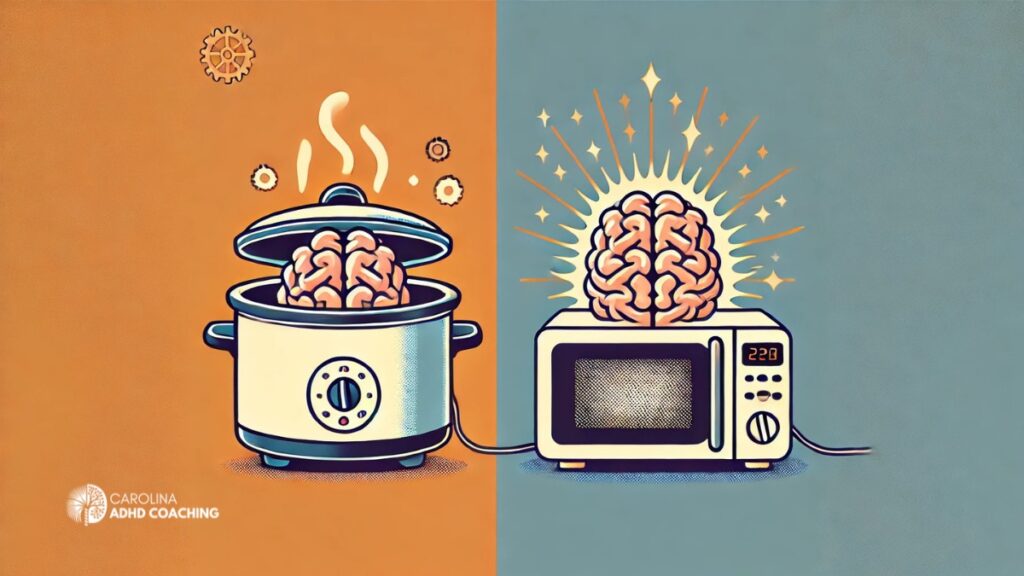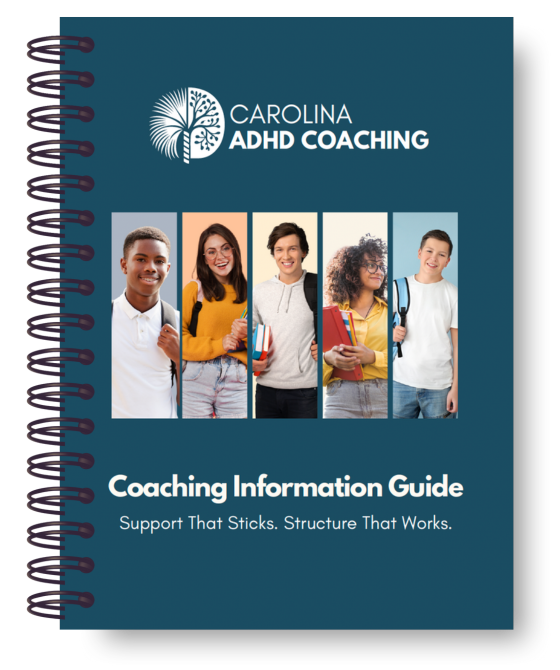Let’s talk about a classic ADHD conundrum. ADHD and neurodivergent brains love fast.
We get an idea and we want to act on it right now.
Suddenly, we’re into beading — and naturally, we need to become an expert and have all the supplies.
We decide we want to try out for a team — and we need permission, signup info, and gear… immediately.
But then?
When it comes to a simple 5-minute room pickup?
Initiating that can take hours… or days… and about three increasingly desperate reminders from a parent. This is where those executive function skills in teens come into play.
Just like the classic story of The Tortoise and the Hare, we like to call this: ✨ The Tale of the Crockpot vs. the Microwave Brain. ✨

Crockpot vs. Microwave: What Do We Mean?
When we say “Crockpot brain” vs. “Microwave brain,” we’re talking about how different tasks feel to an ADHD or neurodivergent brain — especially when it comes to executive function.
👉 Microwave tasks → instant energy, high interest, fast rewards
👉 Crockpot tasks → slow to start, require patience, payoff comes later
Here’s how it looks in real life:
| Scenario | Crockpot or Microwave? |
|---|---|
| Starting a brand-new art project you thought of 5 minutes ago | Microwave |
| Waiting through 4 weeks of practice before the first game of a new sport | Crockpot |
| Researching a hyper-focus topic for 3 hours straight | Microwave |
| Cleaning the room in small chunks over several days | Crockpot |
| Signing up for a club you’re suddenly excited about | Microwave |
| Building a habit of using a planner every week | Crockpot |
Why does this matter?
Because executive function skills in teens are mostly Crockpot skills — they require time, repetition, patience, and delayed rewards. And that’s why ADHD brains often resist them — not because of laziness, but because their wiring prefers Microwave energy.
Why Quick Fixes Often Fail ADHD Brains
Here’s where the challenge really shows up: most executive function skills in teens are “Crockpot” skills — but parents (and schools!) often try to “Microwave” them.
👉 Reward charts to instantly “fix” organization
👉 One-time planner setups expected to last all year
👉 Lectures or consequences meant to spark immediate change
These approaches usually don’t stick — not because the teen is unmotivated or defiant, but because they skip over how executive function develops.
Building executive function skills in teens takes:
✅ Repetition
✅ Routine
✅ External supports
✅ Coaching and gentle accountability
✅ Time for skills to “simmer” and take hold
When we expect Microwave results from a Crockpot process, everyone ends up frustrated — parents and teens alike.
What Actually Helps Build Executive Function Skills in Teens
So if quick fixes don’t work — what does?
The good news is that executive function skills in teens can be built — but it’s a slow-cook process. The key is to lean into what supports Crockpot growth:
✅ Repetition over time.
Skills like planning, task initiation, and time management need regular practice — not one-and-done lessons.
✅ Routines and structure.
Predictable routines help reduce mental load and create a stable environment for skill-building.
✅ External supports.
Tools like visual reminders, checklists, and coached scaffolding make abstract skills more concrete.
✅ Realistic expectations.
Understanding that progress will be slow and non-linear helps everyone stay patient — including the teen!
✅ Coaching and supportive programs.
Working with an ADHD Coach or programs like the Academic Coaching Studio provide consistent, compassionate reinforcement — the kind of slow and steady support that helps executive function skills “simmer” and stick.
Related Reads:
- 5 Executive Function Strategies That Actually Work
- Top 10 Executive Function Skills Teens Build Through Coaching
✨ Looking for patient, steady support to help your teen build executive function skills?
We’d love to help. Our ADHD and executive function coaching is designed to meet teens where they are — and help them build the skills they need to thrive, one step at a time.

Get an inside look at how our coaching works, what to expect, and how to get started. It’s free — and packed with helpful info for parents and students!
Download the Guide


